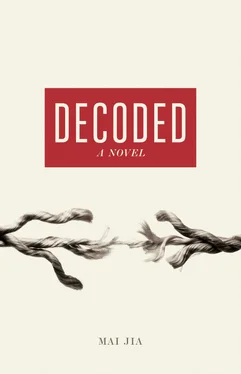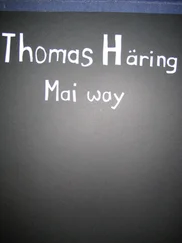Mai Jia - Decoded
Здесь есть возможность читать онлайн «Mai Jia - Decoded» весь текст электронной книги совершенно бесплатно (целиком полную версию без сокращений). В некоторых случаях можно слушать аудио, скачать через торрент в формате fb2 и присутствует краткое содержание. Год выпуска: 2014, Издательство: Allen Lane, Жанр: Современная проза, на английском языке. Описание произведения, (предисловие) а так же отзывы посетителей доступны на портале библиотеки ЛибКат.
- Название:Decoded
- Автор:
- Издательство:Allen Lane
- Жанр:
- Год:2014
- ISBN:нет данных
- Рейтинг книги:3 / 5. Голосов: 1
-
Избранное:Добавить в избранное
- Отзывы:
-
Ваша оценка:
- 60
- 1
- 2
- 3
- 4
- 5
Decoded: краткое содержание, описание и аннотация
Предлагаем к чтению аннотацию, описание, краткое содержание или предисловие (зависит от того, что написал сам автор книги «Decoded»). Если вы не нашли необходимую информацию о книге — напишите в комментариях, мы постараемся отыскать её.
Decoded — читать онлайн бесплатно полную книгу (весь текст) целиком
Ниже представлен текст книги, разбитый по страницам. Система сохранения места последней прочитанной страницы, позволяет с удобством читать онлайн бесплатно книгу «Decoded», без необходимости каждый раз заново искать на чём Вы остановились. Поставьте закладку, и сможете в любой момент перейти на страницу, на которой закончили чтение.
Интервал:
Закладка:
The fact is that when Daddy was a government official, he was determined to demonstrate how impartial he was, particularly when it came to hiring new staff — he avoided giving a job to anyone with even the remotest connection to the family, to the point where he seemed positively heartless. We in the Rong family founded N University, and if you gathered together all the members of the clan who had worked there over the generations, at the very least you would have had enough people to fill a couple of dinner tables. When Grandpa (Old Lillie) was alive, he looked after the family, finding them jobs in the government and giving those in academia the opportunity to develop their talents, visit other institutions and learn something from them. . But when it came to Daddy, to begin with he had an official position but no real power, so even if he had wanted to help out he would not have been able to. Later on, when he had both the official position and the power, he could have helped out but he didn’t choose to. During the years that Daddy was the chancellor of the university, he did not give a job to one single member of the Rong family, no matter how well qualified they were. Even in my case, the department recommended me for promotion a couple of times, wanting to make me assistant dean, but each time he turned it down. He put a cross down just like you would when finding a mistake on an examination paper. What happened to my brother was even more infuriating — he had come back to the country from abroad with a PhD in physics and he really should have been recruited by N University, but Daddy told him to go elsewhere. Just think about it: in C City, where else could he go? He ended up at the Normal University, but the working conditions and the level of the students were both significantly inferior — he took a job in a university in Shanghai the following year. Mummy was really furious with Daddy about this. She said that he was intentionally forcing our family to split up.
Well, when it came to recruiting Zhendi for the new research facility, all Daddy’s principles about not giving jobs to members of the family went out of the window. He ignored all the gossip and just did what he wanted — he seemed to have become completely obsessed. Nobody understood what could possibly have changed Daddy’s mind; but I knew, because one day he showed me the letter Jan Liseiwicz wrote just before he left. He said, ‘Liseiwicz’s letter did tempt me, but the real clincher was when I saw Jinzhen’s graduation thesis. Up until that moment I thought the whole thing was going to be impossible, but when I saw that I decided to give it a go. When I was young, I really hoped that one day I would be able to make some concrete contribution to science. Maybe it really is too late to start now, but Jinzhen has given me the confidence to try. You know, Liseiwicz is absolutely right: without Jinzhen, I would not stand a hope in hell; but with Jinzhen, who knows what we might not achieve? In the past, I have always underestimated the kid’s genius; now I am going to give him a real chance to show what he can do. . ‘ [To be continued]
That is how it all happened. As Master Rong said, her father was inspired to work on this project by Jinzhen — how could he possibly give the job to anyone else? She went on to explain that Jinzhen not only changed the last years of her father’s life, he also changed one of his long-standing principles — you could even say he changed his faith in humankind. In the very last years of his life, the old gentleman went back to the dreams of his youth — he decided to make a real contribution to the development of the field, to the point where he was prepared to discount as worthless everything he had done during most of his working life; everything he had done during his public career. It has always been one of the problems that Chinese intellectuals face: that they regard an academic career as fundamentally incompatible with an official position. Now the old gentleman was effectively starting his working life over again; whether this was a tragedy or a source of great delight, only time will tell.
Over the course of the next couple of years, the pair of them were completely immersed in their work for this research facility — they had very little to do with what was going on in the outside world. They attended the occasional mathematics conference and published a few papers; that was it. From the six papers that they co-authored which appeared in academic journals, it was clear that their work was progressing one step at a time — certainly their research was much further advanced than any other facility in the country, and they were not far behind the international cutting edge. After their first two papers were published in China, they were reprinted in three different international journals — indicating the importance of the results that they had achieved. It was around this time that the chief editor of Time magazine in the US, Roy Alexander, warned the American government: the next computer is going to be built by the Chinese! Jinzhen’s name was now news.
Of course, this was all media scare-mongering. The fact is that if you read this pair of papers closely, ignoring all the hype, you would immediately notice that they had encountered some very real problems in the course of their research. That was perfectly normal — after all a computer is not like a human brain; with people all you need is to have a man sleep with a woman and lo and behold! You have a new example of human intelligence created. Of course, in some cases once the new intelligence is created things go wrong — the result is someone with a mental handicap. In many ways, in the creation of artificial intelligence, what you were trying to do could be compared to turning a mentally handicapped person into a clever one — a very, very difficult task. Given the difficult nature of the task, frustration and setbacks are only to be expected — there is nothing to be surprised at there. In fact, it would be surprising if these frustrations and setbacks made you give up. Later on, when Young Lillie decided to let Jinzhen go, nobody believed a word of his explanation. He said, ‘We have encountered enormous problems in our research and if we carry on like this, I really cannot see any prospect of success. I don’t want to see such a talented and clever young man follow me down this questionable path, running the risk of ruining his own future. I want to make sure that he gets to do something meaningful.’
That was in the summer of 1956.
That same summer, everyone in the university was talking about the man who came to take Jinzhen away. People thought that the whole thing was most mysterious. Why Young Lillie was prepared to let Jinzhen go was much discussed, but without anyone coming up with a good answer — that was part of the mystery.
The man walked with a limp.
That was also part of the mystery.
The First Turn
1
This man’s surname was Zheng, and he walked with a limp. Perhaps because of this striking characteristic, it seemed as though he did not need a personal name — that it was an unnecessary ornament, like wearing a piece of jewellery. He will appear at various crucial junctures in this narrative — some of the time he will be anonymous and some of the time he will be referred to by the name Zheng the Gimp.
‘Zheng the Gimp!’
‘Zheng the Gimp!’
The mere fact that people were happy to call him that tells you one important fact about the man — his life was not defined by his physical disability. If you think about it, there are two possible reasons for such a reaction: One, that Zheng the Gimp got that way as the result of an honourable wound — it was the proof that he had once carried a gun and fought side-by-side with his comrades. Two, that Zheng the Gimp’s leg wasn’t that bad — it was just that his left leg was a little bit shorter than his right. When he was younger, such a difference could have been corrected by wearing a shoe with a thicker sole on the relevant foot, but once he got past fifty, he was reduced to walking with a cane. When I met him, he walked with a stick, but he was not the kind of old man that you can possibly overlook. This was in the early 1990s.
Читать дальшеИнтервал:
Закладка:
Похожие книги на «Decoded»
Представляем Вашему вниманию похожие книги на «Decoded» списком для выбора. Мы отобрали схожую по названию и смыслу литературу в надежде предоставить читателям больше вариантов отыскать новые, интересные, ещё непрочитанные произведения.
Обсуждение, отзывы о книге «Decoded» и просто собственные мнения читателей. Оставьте ваши комментарии, напишите, что Вы думаете о произведении, его смысле или главных героях. Укажите что конкретно понравилось, а что нет, и почему Вы так считаете.












